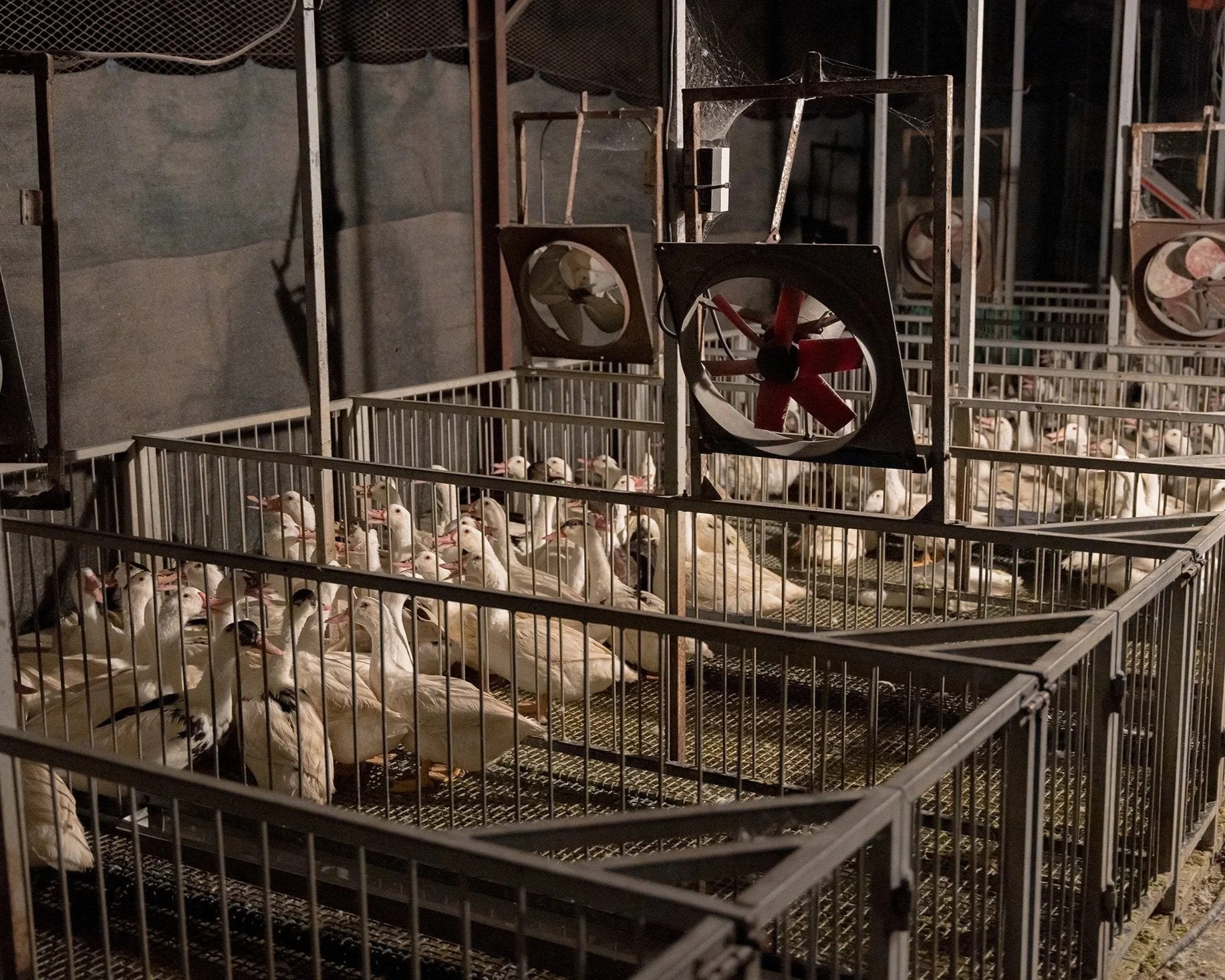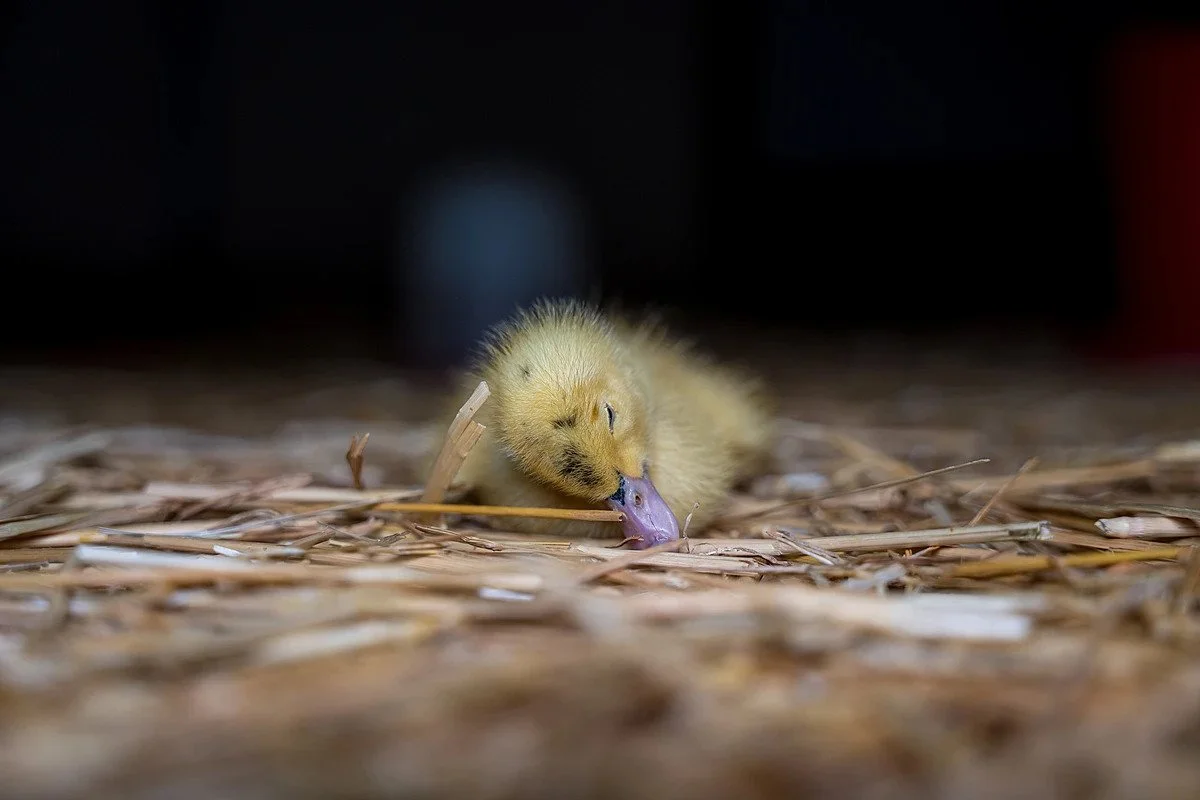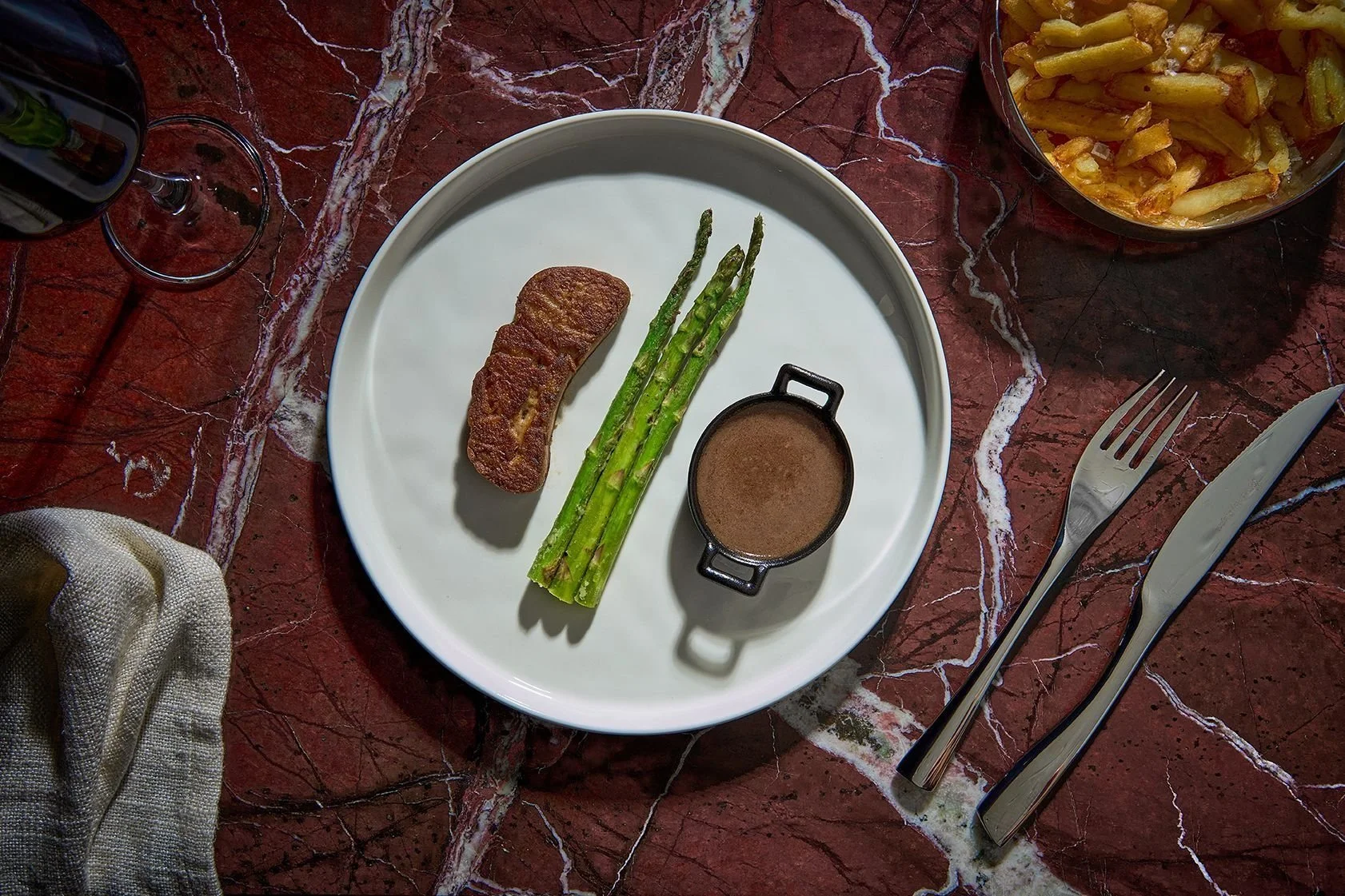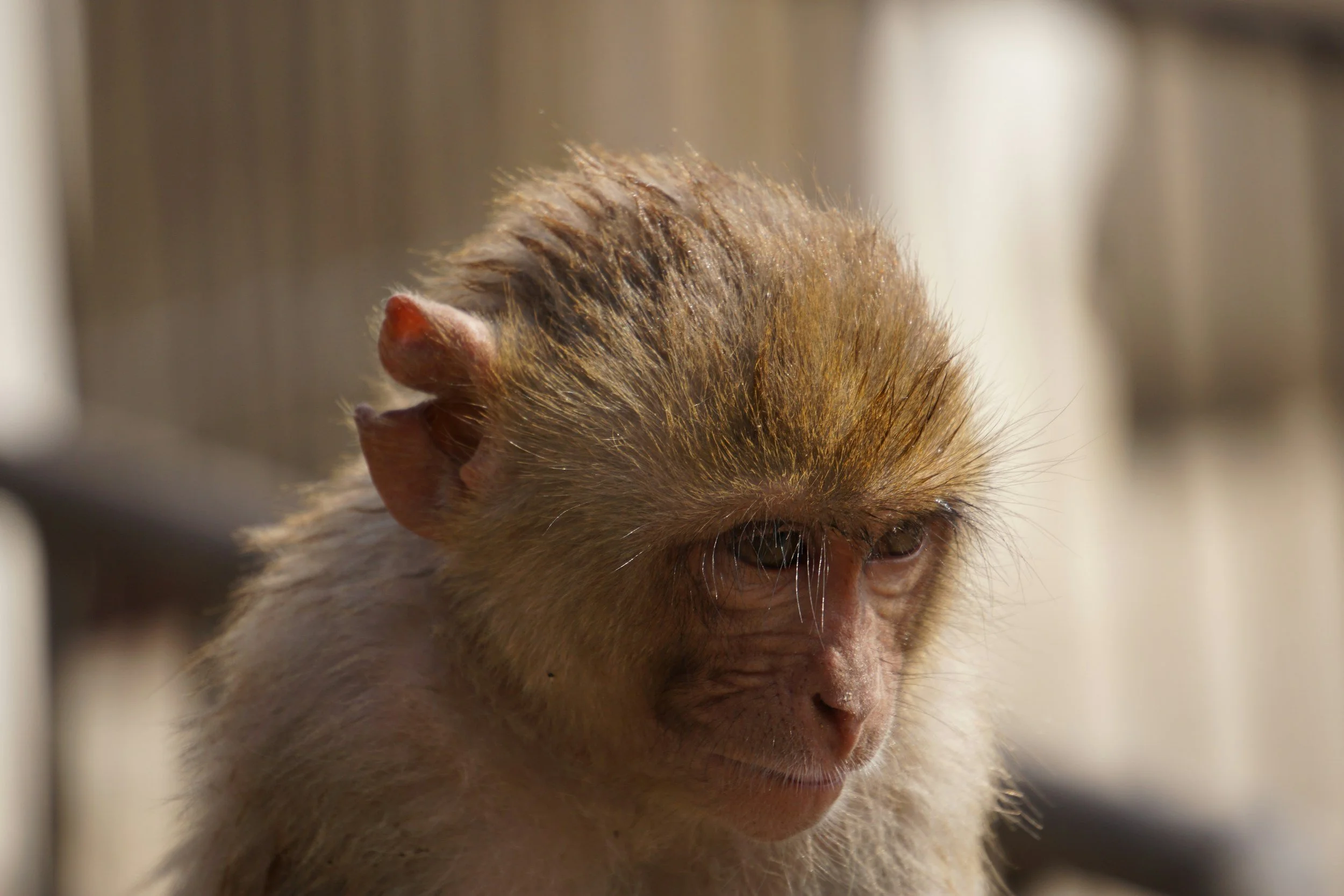Is foie gras the world’s cruelest food?
Credit: Pierre Parcoeur / We Animals
Foie gras, a so-called delicacy, is made from the livers of geese and ducks who have had pipes rammed down their throats several times a day. Despite the undeniable cruelty involved, global demand for this horrific product continues to rise.
The term "foie gras" is French for "fat liver." The production process involves confining 12-week-old ducks and geese in small, dark pens for weeks, during which they are force-fed. As foie gras producers only use male birds, the female birds are considered 'unwanted'. This means that they are typically killed shortly after birth by maceration – a euphemism for grinding or shredding young, sentient chicks.
During the force-feeding process, the feeder grabs the bird's neck, inserts a 20-30 cm long tube into its gullet, and pumps a highly starchy corn mash into its stomach. This causes their livers to swell to between six and 10 times their normal healthy size. The force-feeding process causes extreme fear and anxiety, as birds are restrained and made to eat against their will and the use of metal tubes during feeding leads to painful internal injuries, including bruising, hemorrhaging, and trauma. After the birds’ livers have expanded significantly, the animals are slaughtered and the livers are removed and processed. The result is a diseased and extremely enlarged fattened liver- poached, fried, or made into a pâté—a délicatesse for some, a life of horror for others.
Typically farmed in intensive conditions, the birds are also deprived of essential natural activities like bathing, foraging, and socializing, whilst the corn-based diet that lacks proper nutrients, causes even more severe health issues to ducks and geese. The list of shocking abuse goes on and on, yet global demand for this product continues to rise. So, why is this happening?
Credit: Pierre Parcoeur / We Animals
Credit: Luis Tato / HIDDEN / We Animals
Strong lobbying power
The conversation around banning foie gras has been going on for decades, with many viewing it as a vital part of French heritage and gastronomy. Supporters of foie gras claim that force-feeding mimics a natural behavior of wildfowl before migration, where they increase food intake to build fat reserves for long flights. However, wild birds adjust their metabolism through specific physiological changes, not by consuming large meals. Not to mention that 95% of birds farmed for foie gras are the Muscovy duck, a breed that doesn’t even migrate. And even if the practice were ‘natural’, that doesn’t make it ethical.
The foie gras industry wields significant lobbying power, particularly in France, which produces nearly 80% of the world’s foie gras and legally protects it as part of the country’s cultural heritage. In 1999, the EU passed a law emphasizing the importance of “scientific knowledge” when assessing farming conditions. If evidence shows animals suffer, action should be taken. To get around this, the foie gras industry uses a loophole, arguing that cultural traditions and regional heritage should be considered, and that foie gras production is part of that tradition. As a result, animal welfare concerns are often weighed against cultural practices, with animal suffering taking a back seat.
“Force feeding quickly results in birds that are obese and in a pathological state, called hepatic lipidosis or fatty liver disease. There is no doubt, that in this pathological state, the birds will feel very ill.”
In addition to the industry's strong lobbying power, rising consumer interest in gourmet home cooking and economic growth in the Asia-Pacific region have driven demand. As a result, the market for foie gras continues to grow, fueled by the industry's false and misleading claims about its production, keeping consumers unaware of the cruelty behind it.
Credit: Pierre Parcoeur / We Animals
Global efforts to ban foie gras
But, there is progress. Valid concerns over animal welfare have resulted in numerous lawsuits and legislative bans on foie gras production worldwide. Thanks to the pressure of the organization Animal Equality, India became the first country in the world to ban both the production and import of foie gras in 2014.
France has also seen progress, with fifteen towns including Bordeaux, Poitiers, and Montpellier, banning foie gras from being served at official events due to animal welfare concerns.
Since 2016, many European countries, along with California as the only state in the US, have banned foie gras production but continue to import it due to the EU's 'mutual recognition' rule. This requires products legal in one country to be sold in others. Now that the UK has left the EU, it can ban foie gras imports, potentially pressuring others to follow.
In response to the UK's proposed import ban, the French foie gras trade body, Cifog, rejected allegations of cruelty, calling the move ‘an attack on freedom’. The real attack on freedom is when animals are confined in cages, violently force-fed, and deprived of their basic right to live freely and naturally. True freedom is the ability to move, to choose, and to live without fear - something that these birds are never granted in the foie gras industry.
What's the solution?
As demand for foie gras grows, cruelty-free alternatives are stepping in to fill the need. From 2024 to 2034, the plant-based foie gras market is expected to grow by 5.3%. These products offer an ethical, more affordable, and often healthier option. Leading producers of alternative foie gras include French company Aberyne, and Foodys and Hello Plant Foods in Spain. Meanwhile, in London, French Michelin-starred chef Alexis Gauthier, who turned his restaurant Gauthier Soho completely vegan, has created “faux gras” using plants.
Cultivated foie gras is also gaining momentum in particular, with several companies innovating in the space. Paris-based startup Gourmey has submitted the EU’s first application for cultivated foie gras, aiming to bring a cruelty-free alternative to top chefs by 2026 and eventually to consumers. The company has also applied for market approval in the UK, Switzerland, Singapore and the US.
Vow is also entering the market. The cultivated meat company debuted ‘Forged Gras’, a foie gras alternative derived from Japanese quail cells, in November of last year. Created entirely without animal suffering or slaughter, the product is currently available at a handful of restaurants in Singapore and Hong Kong. Vow also recently received approval in Australia and is set to debut in restaurants and supermarkets across the country.
Whether plant-based or cultivated, the next generation of foie gras proves that indulgence doesn’t have to come at a cost.
Forged Gras with Frites. Credit: Forged by Vow
What can you do?
California is currently the only US state with a foie gras ban in place, although residents can still order foie gras from out of state. Chicago banned the sale of foie gras in 2006, but the measure was overturned two years later. Similarly, in New York last year, the State Supreme Court overturned New York City's 2019 ban on the sale of foie gras, claiming that it violated state agricultural laws.
This means that ducks and geese need our support now more than ever. Species Unite’s community is ramping up the pressure on the US foie gras industry by calling for a nationwide ban, arguing that it directly violates the USDA’s Poultry Products Inspection Act, which requires that “diseased poultry carcasses and parts be condemned.” Will you join the 9,741 others who have signed our petition? Add your name here.
Written by Sarah-Manon Blok
Sarah-Manon Blok is a freelance journalist dedicated to using food as a catalyst for meaningful change. With a focus on sustainability and ethics, she inspires others through her plant-based catering service Planty To Love, her regenerative farm, and her writing to make more conscious and impactful choices.
Want to write for Species Unite? We are looking for well-written stories focusing on content that informs, inspires, and engages our audience with topics surrounding animal rights.
We Have A Favor To Ask…
Species Unite amplifies well-researched solutions to some of the most abusive animal industries operating today.
At this crucial moment, with worldwide momentum for change building, it’s vital we share these animal-free solutions with the world - and we need your help.
We’re a nonprofit, and so to keep sharing these solutions, we’re relying on you - with your support, we can continue our essential work in growing a powerful community of animal advocates this year.









As plant-based diets gain scientific backing, critics say the meat industry is deploying coordinated tactics to shape public opinion.